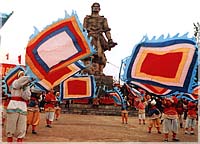Dong Da, situated in the southern part of Hanoi, is the place where, 200 years ago, Emperor Quang Trung {reigning 1788-1792) defeated the 200,000-strong Qing invading army.
On the evening of the 4th and on the 5th of the first lunar month - that is 29-30 January 1789 - the enemy redoubt in Khuong Thuong was overwhelmed by Vietnamese forces, and its Commanding Officer, General Sam Nghi Dong, committed suicide. Thereafter the Commander-in-Chief of the Expeditionary Corps, Gen. Ton Si Nghi, hurried away from the Vietnamese capital and ran back to
After the battle, there were heaps of enemy corpses almost everywhere, in the fields and along the roads, and they had to be gathered up and buried in common graves which were so big that they became in the end hills and hillocks over which grew trees. The inhabitants of Nam Dong and Thinh Quang villages also built a pagoda, called Dong Quang pagoda, in front of the hillocks. From then on, Dong Quang Pagoda annually organized a religious ceremony to commemorate the Dong Da battle on the 5th day of the Lunar New Year.
Gradually, the commemoration became a festival, involving many games and plays, such as wrestling, the swing, cock fights, etc. An outstanding item of these games is the Fire Dragon, a 15m long dragon made of cloth and paper. A group of young men wearing close-fitted white clothes, with red stripes and belts, and blue puttees, raise the dragon to their heads and perform the dance of the "hovering dragon". Another group of young men walks around the dragon procession, performing martial arts to show their ability and also to simulate the historic battle. The people in the neighboring area also make a repeat performance of the old tactic of using fire to attack the besieged enemy in Khuong Thuong and Dong Da area by burning oil-soaked straw cords and producing fire lines and fire circles. The general picture is that of a dragon pouncing on and belching fire at the enemy.
During the festival, the Dong Quang Pagoda - located opposite to the Dong Da Hillock - also performs: religious rites, with big groups of the devout presenting joss-sticks and offerings to the souls of the national heroes, and to the souls of enemy troops killed in the battle as well.
On the same day, a number of people also visit the Boc pagoda, and present their respects and offerings before the Duc Ong Statue, a statue which, in the view of many, is actually dedicated to Emperor Quang Trung.
Source: vnstyle














COMMENTS